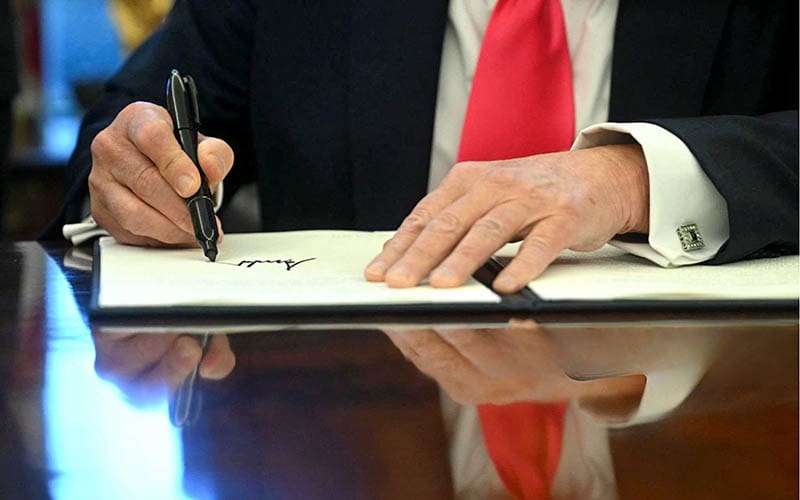
President Trump signed an executive order declaring English the sole official language of the U.S. – a move undermining decades of civil rights protections. Photo: Shutterstock.
When you’re in a crisis, the last thing you should have to worry about is whether you can understand what’s going on. Whether it’s an emergency alert, a hospital visit, or a legal matter, clear information can mean the difference between safety and harm. And receiving that information in a language you can fully comprehend makes a world of difference.
For decades, civil rights protections have guaranteed that language isn’t a barrier to accessing vital services. But with a stroke of his pen, Trump just tried to change that. His executive order declaring English the only official language of the United States isn’t just a symbolic move. It’s an attack on people’s freedom to speak, advocate for themselves, participate fully in their communities, and see themselves as a key thread in the fabric of our country.
So, can he actually do that?
The Legal Landscape: What Protects Language Access?
The United States has never had an official language, and for good reason. We are a nation of many cultures, many histories, and many voices. Previous attempts to declare English the official language have failed in Congress. But Trump is trying to bypass the legislative process through executive action (a disturbing pattern of his second term).
Federal law already provides strong protections against language discrimination. Title VI of the Civil Rights Act of 1964 bans discrimination based on national origin, which courts have ruled includes language-based discrimination. In 2000, President Bill Clinton reinforced this by signing Executive Order 13166. It required federal agencies and federally funded programs to provide meaningful language access services.
That means crucial information – about healthcare, public safety, and legal rights – must be available in the languages people understand. That’s the reason hospitals provide interpreters, and emergency alerts aren’t just in English. And that’s why residents fighting pollution, industrial facilities, or harmful development must be given the language tools (i.e. written documents in different languages and translators) to participate in public hearings and legal processes.
Trump’s executive order undermines all of that. It directs federal agencies to make language access services available “as they deem necessary.” Too often, communities already have to fight to ensure translation and other language services are available. This move by the Trump administration would make that even harder by stripping millions of people of their right – and ability – to advocate for themselves and their communities.
Will This Executive Order Hold Up?
This is not the first time Trump has attempted to dismantle civil rights protections. And courts have repeatedly ruled that language access is protected under civil rights laws. So, any attempt to revoke those protections through an executive order will run into legal roadblocks, particularly from organizations and communities that rely on them.
And state governments also have significant power to push back. Some states, including Massachusetts, already have laws requiring language access in public services.
But as we’ve also seen, the Trump administration thinks it can ignore the law and legal precedent. So, we cannot be complacent. Even if this executive order doesn’t survive a legal challenge, we must still be vigilant in ensuring that federal agencies follow the law.
Who Stands to Lose?
Stripping language access protections doesn’t just hurt immigrants and non-English speakers – it weakens entire communities. Without translation and interpretation, families cannot access healthcare, emergency services, or exercise their legal rights. Workers may struggle to advocate for better conditions. Parents may not be able to explain to the emergency worker that their child suffers from asthma. Residents fighting pollution or harmful development could be silenced in public hearings.
Businesses and local governments also stand to lose. Hospitals rely on interpreters to ensure patients get proper care. Cities need multilingual communication for public safety. Even law enforcement depends on translation to respond to emergencies. Removing these protections would create confusion, inefficiency, and higher costs down the road.
Anti-immigrant groups have long pushed for English-only policies under the guise of “national unity.” In fact, English-only movements date back to the surge of immigration from southern and eastern Europe in the late 1890s and early 1900s. But the real goal is exclusion – blocking people from participating in their communities and making it harder for them to advocate for themselves.
CLF’s Fight for Language Access in Environmental Justice Communities
This isn’t just a hypothetical issue – it’s happening in communities across New England, where residents are denied a voice in decisions that directly impact their health and well-being. CLF has long fought to ensure that language barriers don’t become barriers to justice.
That fight played out in East Boston, where state officials approved a controversial electrical substation in a flood-prone, mostly Spanish-speaking neighborhood. Many residents couldn’t participate in public hearings because translation services were inadequate, effectively shutting them out of a decision that impacted their safety. CLF worked alongside community advocates to challenge the approval process and ensure residents had a voice.
A similar situation unfolded in New Bedford, where a proposed waste facility expansion threatened the surrounding community. Many non-English-speaking residents were unable to access public hearings or review key documents because state officials failed to provide proper interpretation. CLF filed a Title VI civil rights complaint with the EPA, demanding that the state fix these violations and give all residents a fair opportunity to weigh in.
Cases like these prove that language access isn’t just about communication – it’s about power. When governments fail to provide proper translation and interpretation, they are silencing the very people who are most affected by their decisions. That’s why CLF continues to fight for language justice: no one should be excluded from protecting their health, home, or future.
The Bottom Line: No Executive Order Can Erase Our Voices
Trump’s executive order isn’t about efficiency or unity – it’s about silencing millions of people. But language access is a civil right, and legal safeguards make it difficult for the Trump Administration to strip those protections away.
States, civil rights organizations, and advocacy groups are already mobilizing to challenge this action. And history shows that Trump’s attempts to weaken civil rights protections often fail in court.
The freedom to speak your mind in the language you are most comfortable with is a fundamental right. And no president – past or present – should take that away.



